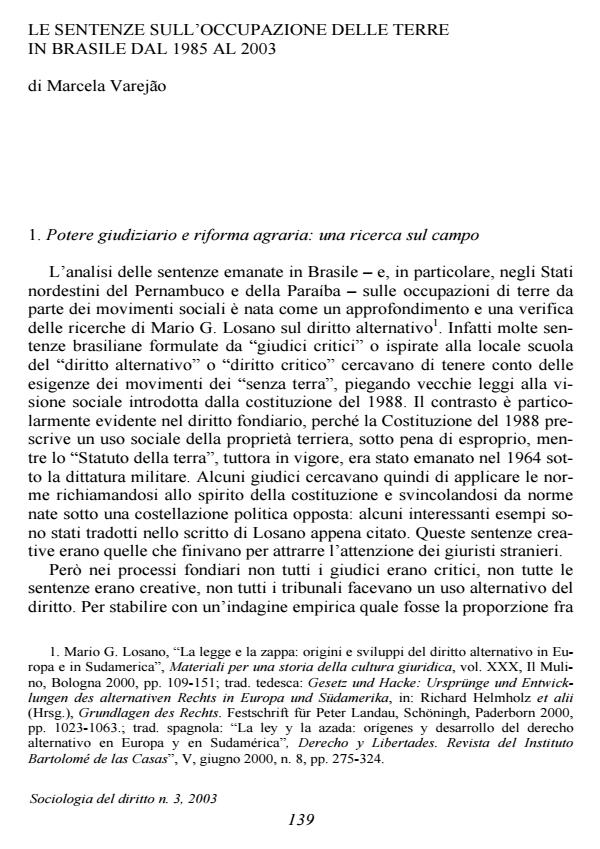Le sentenze sull'occupazione delle terre in Brasile dal 1985 al 2003
Journal title SOCIOLOGIA DEL DIRITTO
Author/s Marcela Varejao
Publishing Year 2004 Issue 2003/3
Language Italian Pages 33 P. File size 204 KB
DOI
DOI is like a bar code for intellectual property: to have more infomation
click here
Below, you can see the article first page
If you want to buy this article in PDF format, you can do it, following the instructions to buy download credits

FrancoAngeli is member of Publishers International Linking Association, Inc (PILA), a not-for-profit association which run the CrossRef service enabling links to and from online scholarly content.
A two-year research project conducted in Italy, Brazil and Argentina looked into the problems facing agrarian reform today. In Brazil, the judicial decisions handed down about the lands occupied by the Landless Movement (Movimento Sem Terra, MST) were studied. This essay reports on the findings of the analysis, describing the general framework adopted for the research, how judicial power is organised in Brazil, the various phases of the analysis of the Brazilian judiciary’s decisions (most of which came from the region of the North-East) and the results of these analyses. The decisions of the higher courts were taken from the official Law Reports, while the decisions handed down by the courts of Pernambuco and Paraíba had never been published before. For example, in the Court of Justice (Tribunal de Justiça) of Paraíba, the researchers studied volumes, each comprising about 600 pages, that are compilations of the judicial decisions: some 231 collections of civil law decisions and 157 collections of criminal law decisions and sentences, making a total of 388 collections of decisions, covering the years from 1985 to 2002. From these collections, the researchers selected 33 civil law decisions and nine criminal law decisions, in a process of drastic reduction that indicates just how few decisions are innovative rather than merely formalistic. The statistics derived from the decisions (which are illustrated in six graphs) demonstrate that the majority of them uses purely formal criteria to apply the Brazilian law in force to the land occupations: the result is an entrenched defence of landed property. Nonetheless, the research cites numerous dicta taken from the few decisions that attempt to approach things differently, i.e. adopting a more open stance towards the squatters on the basis of considerations of a sociological nature. The conclusion is drawn that the agrarian reform is the greatest challenge facing Brazil’s current left-wing government and identifies the executive rather than the judiciary as the power that is more likely to give a new impulse to this long overdue and excessively slow reform.
Marcela Varejao, Le sentenze sull'occupazione delle terre in Brasile dal 1985 al 2003 in "SOCIOLOGIA DEL DIRITTO " 3/2003, pp , DOI: